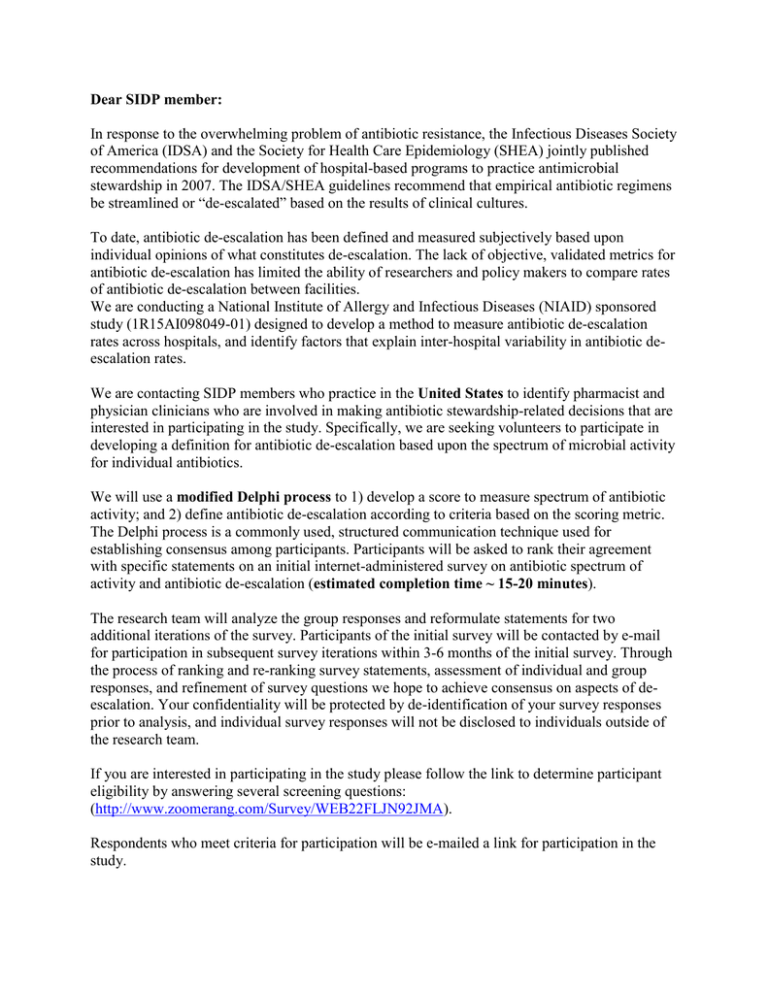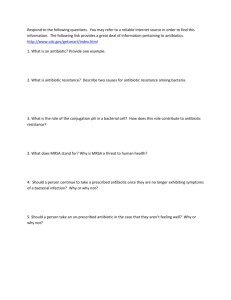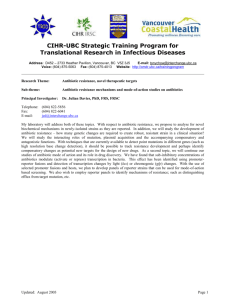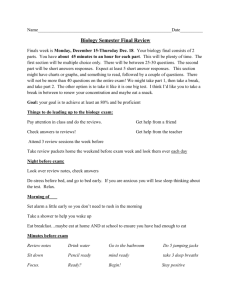Dear SIDP member: In response to the overwhelming
advertisement

Dear SIDP member: In response to the overwhelming problem of antibiotic resistance, the Infectious Diseases Society of America (IDSA) and the Society for Health Care Epidemiology (SHEA) jointly published recommendations for development of hospital-based programs to practice antimicrobial stewardship in 2007. The IDSA/SHEA guidelines recommend that empirical antibiotic regimens be streamlined or “de-escalated” based on the results of clinical cultures. To date, antibiotic de-escalation has been defined and measured subjectively based upon individual opinions of what constitutes de-escalation. The lack of objective, validated metrics for antibiotic de-escalation has limited the ability of researchers and policy makers to compare rates of antibiotic de-escalation between facilities. We are conducting a National Institute of Allergy and Infectious Diseases (NIAID) sponsored study (1R15AI098049-01) designed to develop a method to measure antibiotic de-escalation rates across hospitals, and identify factors that explain inter-hospital variability in antibiotic deescalation rates. We are contacting SIDP members who practice in the United States to identify pharmacist and physician clinicians who are involved in making antibiotic stewardship-related decisions that are interested in participating in the study. Specifically, we are seeking volunteers to participate in developing a definition for antibiotic de-escalation based upon the spectrum of microbial activity for individual antibiotics. We will use a modified Delphi process to 1) develop a score to measure spectrum of antibiotic activity; and 2) define antibiotic de-escalation according to criteria based on the scoring metric. The Delphi process is a commonly used, structured communication technique used for establishing consensus among participants. Participants will be asked to rank their agreement with specific statements on an initial internet-administered survey on antibiotic spectrum of activity and antibiotic de-escalation (estimated completion time ~ 15-20 minutes). The research team will analyze the group responses and reformulate statements for two additional iterations of the survey. Participants of the initial survey will be contacted by e-mail for participation in subsequent survey iterations within 3-6 months of the initial survey. Through the process of ranking and re-ranking survey statements, assessment of individual and group responses, and refinement of survey questions we hope to achieve consensus on aspects of deescalation. Your confidentiality will be protected by de-identification of your survey responses prior to analysis, and individual survey responses will not be disclosed to individuals outside of the research team. If you are interested in participating in the study please follow the link to determine participant eligibility by answering several screening questions: (http://www.zoomerang.com/Survey/WEB22FLJN92JMA). Respondents who meet criteria for participation will be e-mailed a link for participation in the study. If you have any questions about participation in this study please contact: Principal Investigator: Karl Madaras-Kelly, Pharm.D., M.P.H. College of Pharmacy, Idaho State University C/O Veterans Affairs Medical Center 119 A 500 W. Fort St. Boise, ID., 83702 Ph 208-422-1000 ext. 7680 or Karl.Madaras-Kelly2@va.gov or Co- Investigator: Matthew Samore School of Medicine, University of Utah C/O Salt Lake City Veterans Affairs Medical Center HSR+D IDEAS Center 500 Foothills Dr Salt Lake City, UT., 84148 Ph: 801-582-1565, ext. 2454 or Matthew.Samore@va.gov The contact telephone number and e-mail addresses above will be monitored during the recruitment period Monday-Friday 8:00-4:30 MST and inquiries will generally be returned within 24 hours.


